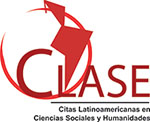La inteligencia emocional y su relación con el aprendizaje del idioma inglés en niños de 4 a 5 años en preescolar
DOI:
https://doi.org/10.23857/dc.v7i4.2192Palabras clave:
Emotional Intelligence, English language learning, Chi-square test, Social talk, Private talk.Resumen
Emotional Intelligence is part of the experience of all human beings during their life, for that reason children as well as adults suffer various emotions in their daily lives every day, such as: fear, shame, cheerfulness, sadness, empathy, anger, among others. The objective was to determine the incidence of emotional intelligence in English Language learning in children between 4 and 5 years of age form Pre-Kinder, from Leonardo da Vinci Educational Unit, Riobamba, Ecuador. The study was a non-experimental investigation of a transectional-descriptive type with a mixed approach, applying field and documentary research, which modality was socio-educational. The population consisted of 56 children, 29 girls and 27 boys. The observation technique and the notebook instrument were applied to gather information. The information was compiled in a database and analyzed through descriptive statistics. The non-parametric Chi-square test (X2) was applied to verify the hypothesis using the SPSS software. The results were illustrated in graphs with mathematical values. The statistical value of the Chi-square test was X2cal = 4.158 < X2tab = 11.070, with 5 df y with a value of α=0.05. In conclusion, the Chi-square test rejected the Null Hypothesis (Ho), accepting the Alternative Hypothesis (H1) because the calculated value of Chi-square is less than the critical value of Chi-square with 5 degrees of freedom and with a significant level of 0.05. In conclusion, the Emotional Intelligence variable is associated with the English Language Learning variable, where the emotion of fear (19.64%) being the most frequent in social talk, followed by shame (14.28%) in private talk.
Citas
Altamirano, J. (2015). Evaluación de los Aprendizajes Infantiles. Quito: Cmunicación Solutions.
Amar, J., Abello, R., & Tirado, G. y. (2004). Desarrollo Infantil y Construcción del mundo socila. España.
Ausubel, D. (2002). Adquisición y retención del conocimiento: Una perspectiva cognitiva (2 ed.). Barcelona: Paidós Ibí©rica.
Bruner, J. (1995). Desarrollo cognitivo y educación. (E. Moreta, Ed.) España: Selección de textos por Jesíºs Palacios.
Cameron, L. (2001). Teaching languages to Young learners. England: Cambridge University Press.
Damasio, A. (2010). Self Comes to Mind. Nueva York: Vintage Books.
Dí¶rnyei, Z. (1998). Motivation in second and foreing language learning. California: CILT.
Espinoza, J. (2015). La Inteligencia Emocional como herramienta pedagógica para un mejor rendimiento escolar en niños (as) en edad preescolar del jardín de niños General Josí© de San Martín (Tesis de pregrado). La Paz, Bolivia: Universidad Mayor de San Andrí©s.
Flick, U. (2014). La gestión de la calidad en la investigación cualitativa. Madrid: Morata.
Flores, R., Mí©ndez, J., Peraza, J., Quevedo, A., Revilla, E., & Sánchez, G. (2016). Manual de Trabajos de Grado de especialización y maestrías, y tesis doctorales (5 ed.). Venezuela: FEDUPEL.
García, M. (2018). La gestion de las emociones, una necesidad en el contexto educativo y en la formación profesional. Revista Espacios, 39(49), 8-20.
Hernández, R. (2006). Metodología de la investigación. Mí©xico: MacGrew-Hill.
Hernández, R., Fernández, C., & Baptista, P. (2014). Mtodología de la Investigación (6 ed.). Mí©xico: McGraw-Hill.
Kerlinger, N., & Lee, B. (2002). Investigación del comportamiento: Mí©todos de investigación en Ciencias Sociales (4 ed.). Mí©xico: McGraw-Hill.
Lightbown, P. (2004). Early Childhood Bilingualism. England: Oxford University Press.
López, M., & González, M. (2005). Inteligencia Emocional. Colombia: GAMMA.
López, R. (s.f.). Creencias sobre el aprendizaje del idioma inglí©s desde la perspectiva del estudiantado infantil. Extensión en Red(7), 100-115. Obtenido de https://perio.unlp.edu.ar/ojs/index.php/extensionenred/article/ view/3434/2937
Moon, J. (2005). Children Learning English: a guidebook for English Language. London: Mscmillan. Obtenido de http://hdl.handle.net/11162/64634
Muñoz, E. (2017). La Inteligencia Emocional en el aula de 5 a 6 años (Tesis de pregrado). Rioja, España: Universidad Internacional de la Rioja.
Owens, R. (2008). Language Development (5 ed.). (U. d. York, Ed.) Madrid: Person Prentice Hall.
Papalia, D., Feldman, R., & Martorell, G. (2012). Desarrollo Humano. Mí©xico, D.F.: McGraw-Hill.
Payne, W. (1986). A study of emotions: Developing emotional intelligence: Self-integration; relating to fear, pain and desire. (43), 203 A. (U. M. 8605928, Ed.) Dissertation Abstracts International.
Peña, T. (2006). Una introducción a la Psicología. Caracas: Texto C.A.
Quidelf, D., Del Valle, J., Arí©valo, L., Áancucheo, C., & Ortíz, R. (2014). La enseñanza del idioma inglí©s a temprana edad: su impacto en el aprendizaje de los estudiantes en escuelas píºblicas. Vivat Academia(129), 34-56. doi:http://dx.doi.org/10.1518/va.2014.129.34-56
Quishpe, L. (2017). Efectos de las Prácticas de Evaluación en la Calidad de la Competencia Comunicativa del idioma inglí©s. Revista Sathiri-Sembrador, 2(12), 224-246.
Quishpe, L. (2020a). Emotional Intelligence in the English Classroom. Revista Científica Dominio de las Ciencias, 6(2), 319-339. Obtenido de https://dominiodelasciencias.com/ojs/index.php/es/issue/view/45/showToc
Riva, A. (2009). Cómo estimular el aprendizaje. Barcelona: Ocí©ano.
Rodríguez, B. (2004). Tí©cnicas metodológicas empleadas en la Enseñanza del inglí©s en Educación Infantil. Estudio de caso. Revista Extensión en Red, 7, 100-115. Obtenido de https://revistas.ucm.es/index.php/D IDA/article/view/DIDA0404110151A
Rodríguez, L. (2015). Desarrollo de la Inteligencia Emocional en los niños y niñas del pre jardín infantil UPTC (Tesis de pregrado). Tunja, Boyacá, Colombia: Universidad Pedagógica y Tecnológica de Colombia.
Rogoff, B. (1993). Aprendices del pensamiento: el desarrollo cognitivo en el contexto social. Mí©xico: Paidos.
Sarduy, V. (2007). Análisis de información y las investigaciones cuantitativa y cualitativa. Rev Cubana Salud Píºblica, 33(3), 1-11.
Spada, N. (1999). How languages are learned. Englad: Oxford University Press.
Tinajero, A., & Mustard, J. (2011). Reporte presentado a la BernardVan Leer Foundation. Obtenido de https://resourcecentre.savethechildren.net/node/5525/pdf/5525.pdf
Vygotsky, L. (1979). El desarrollo de los procesos psicológicos superiores. Mí©xico: Gijalbo.
Publicado
Cómo citar
Número
Sección
Licencia
Authors retain copyright and guarantee the Journal the right to be the first publication of the work. These are covered by a Creative Commons (CC BY-NC-ND 4.0) license that allows others to share the work with an acknowledgment of the work authorship and the initial publication in this journal.






